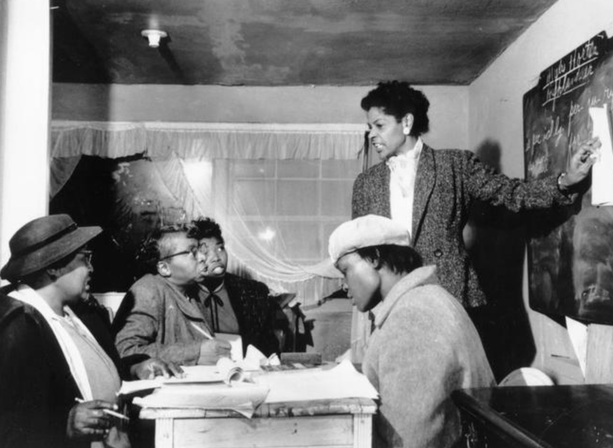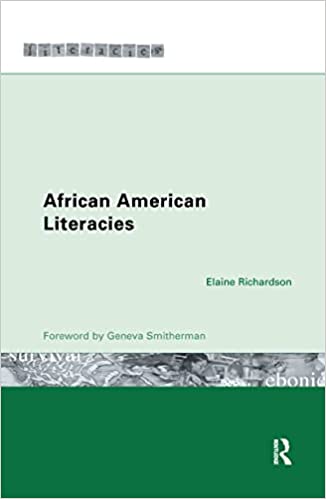
Since the New Literacies Movement (circa 1990s), scholars have added the -s to literacy to push past understanding literacy as merely a set of neutral skills associated with word recognition in basic reading and writing tasks. Instead, the notion of literacies asks us to politicize reading and writing much more than that and further see that alphabetic communication has never been the best or only way to communicate. Its dominance in western education is itself wrapped up in multiple hegemonic issues. This notion of literacies also challenges the dominant idea that literacy is individualistic, measurable, and linearly-developed so that once you attain a certain degree of it, your social and economic status elevates (as if capitalism and structural inequities are not at work). This is why we get folx, even Black folx, routinely saying things like their level of standardized English mimicry and academic writing skills have secured them employment… instead, of, oh, let’s say… THE… CIVIL… RIGHTS… MOVEMENT. Without Black Freedom Struggles, the structural conditions of the past were such that no advanced degrees and/or standardized English offset the expectation that Black folx would only perform domestic duties in white society. We deploy this anti-political version of literacy even while whole cities, states, and school districts rage against book authors and teachers who address race, heteropatriarchy, and anti-Semitism. Literacies studies understands the politics of it all.
So when we talk about literacies, we are talking about the ways that people learn to read and write not just the word, but also the world and what they do with this. Even though literacies with the -s marked a political shift, it was, once again, not big enough of a shift that it could and would incorporate Black feminist thought. And so here we are… talking about literacies “in the spaces left.”
So when we talk about literacies, we are talking about the ways that people learn to read and write not just the word, but also the world and what they do with this. Even though literacies with the -s marked a political shift, it was, once again, not big enough of a shift that it could and would incorporate Black feminist thought. And so here we are… talking about literacies “in the spaces left.”
|
|
In 1999, Jacqueline Jones Royster and Jean C. Williams published “History in the Spaces Left: African American Presence and Narratives of Composition Studies” in College Composition and Communication. To be quite blunt about it: they blasted the field of composition and rhetoric studies sumthin serious. They criticized the ways that historical narratives of the field were heralded as universal without much, if any, recognition from readers or audiences that Black students, Black teachers, and Black histories of literacy, writing, and rhetoric had been outrightly excluded or distorted.
|
Royster and Williams reminded us that every history and every understanding of literacy are ideological and political--- not universal. They asked us for a new kind of history-making and literacy-theorizing where we take up the spaces that the field was not understanding and acknowledge our positionalities in how we historicize. Together, we start by reading "The Black Girls’ Literacies Collective Statement" by the Black Girls’ Literacies Collective. Second, read “To Protect and Serve: African American Female Literacies” by Elaine Richardson.
 Click above for more about the Suggested Reading: African American Literacies
Click above for more about the Suggested Reading: African American Literacies
Other suggested readings:
- “Adolescent African American Girls as Engaged Readers: Challenging Stereotypical Images of Black Womanhood through Urban Fiction” by Simone Gibson
- "All in Together Girls”: Black Women Make Online Community, Not War, Over Beyoncé and Feminism" by LaToya L. Sawyer
- “Alter Egos and Infinite Literacies, Part III: How to Build a Real Gyrl in 3 Easy Steps” by Jessica Marie Johnson and Kismet Nuñez
- “Black Girls and Critical Media Literacy for Social Activism” by Sherell A. McArthur
- "Black Girls Queer (Re)Dress: Fashion as Literacy Performance in Pariah" by Eric Darnell Pritchard
- "Black Feminist Literacies: Ungendering, Flesh, and Post-Spillers Epistemologies of Embodied and Emotional Justice" by Samantha Pinto
- "Black Feminism and Critical Media Literacy: Moving from the Margin to the Center" by Ashley N. Patterson, Arianna Howard, Valerie Kinloch
- "Black Women Researchers’ Path to Breaking Silence: Three Scholars Reflect on Voicing Oppression, Self-reflexive Speech, and Talking Back to Elite Discourses" by Latoya Owens, Erica B. Edwards, and Sherell A. McArthur
- "Can I Get a Witness? Speculative Fiction as Testimony and Counterstory" by S. R. Toliver
- “Centering Black Girls’ Literacies: A Review of Literature on the Multiple Ways of Knowing of Black Girls” by Gholnecsar E. Muhammad and Marcelle Haddix
- “Creating Spaces for Black Adolescent Girls to ‘Write It Out!’” by Gholnecsar E. Muhammad
- "Critical Readings: African American Girls and Urban Fiction" by Simone Gibson
- “Decoding Black Feminist Hashtags as Becoming” by Tara L. Conley
- "Developing Critical Hip Hop Feminist Literacies: Centrality and Subversion of Sexuality in the Lives of Black Girls" by Elaine Richardson
- “Developing Curriculum to Support Black Girls’ Literacies in Digital Spaces” by Detra Price-Dennis
- "Developing the 'Oppositional Gaze': Using Critical Media Pedagogy and Black Feminist Thought to Promote Black Girls’ Identity Development" by Charlotte E. Jacobs
- "Doing Digital Wrongly" by Ruth Nicole Brown, Blair Ebony Smith, Jessica L. Robinson, and Porshé R. Garner
- "Dressed but Not Tryin’ to Impress: Black Women Deconstructing “Professional” Dress" by Brittany Hull, Cecilia D. Shelton, and Temptaous Mckoy
- "Empowering Rhetoric: Black Students Writing Black Panthers" by Gwendolyn D. Pough
- "Exploring Black Girls’ Subversive Literacies as Acts of Freedom" by Lauren Leigh Kelly
- “Ghetto Fabulous: Reading Black Adolescent Femininity in Contemporary Urban Street Fiction” by Elizabeth Marshall, Jeanine Staples and Simone Gibson
- “Google Search: Hyper-visibility as a Means of Rendering Black Women and Girls Invisible” by Safiya Noble
- "History in the Spaces Left: African American Presence and Narratives of Composition Studies" by Jacqueline Jones Royster and Jean C. Williams
- "Human Rights and Civil Rights: The Advocacy and Activism of African-American Women Writers" by Jacqueline Jones Royster and Molly Cochran
- “ 'I’m Very Hurt': (Un)justly Reading the Black Female Body as Text in a Racial Literacy Learning Assemblage" by Esther Ohito
- "Independent Black Institutions and Rhetorical Literacy Education: A Unique Voice of Color" by Jamila M. Kareem
- "Lessons in Transgression: #BlackGirlsMatter and the Feminist Classroom" by Stephanie Troutman and Ileana Jiménez
- " 'Like an Old Soul Record': Black Feminism, Queer Sexuality, and the Hip-Hop Generation" by Andreana Clay
- "‘Like Signposts on the Road’: The Function of Literacy in Constructing Black Queer Ancestors" by Eric Darnell Pritchard
- "Making Citizens Behind Bars (and the Stories We Tell About It): Queering Approaches to Prison Literacy Programs" by Alexandra Cavallaro
- “Narrative Significations of Contemporary Black Girlhood”by Wanda Brooks, Dia Sekayi, Lorraine Savage, Ellyn Waller and Iresha Picot
- “‘New Genres of Being Human’: World Making through Viral Blackness” by Ashleigh Greene Wade
- “'Oh, Those Loud Black Girls!': A Phenomenological Study of Black Girls Talking with an Attitude" by Jacqueline B. Koonce
- "Our Excellence: Where Do We Grow from Here?" by Vivian I. Davis
- "Persephone’s Triumph: Reflections of a Young Black Woman Becoming a Real Political Scientist" by Ruth Nicole Brown
- “ ‘Phenomenal Women,’ Collaborative Literacies, and Community Texts in Alternative ‘Sista’ Spaces” by Beverly Moss
- "Politely Disregarded: Street Fiction, Mass Incarceration, and Critical Praxis" by Karin Van Orman and Jamila Lyiscott
- "'Pretty for a Black Girl': AfroDigital Black Feminisms and the Critical Context of ‘Mobile Black Sociality’ ” by Carmen Kynard
- "Reenvisioning Writing Pedagogy and Learning Disabilities Through a Black Girls’ Literacies Framework" by Erin Hope Whitney
- "Reframing Public Literacy: The loveLife Multimedia Campaign to Prevent HIV in South Africa" by Jacqueline Jones Royster
- "Romantic Correspondence as Queer Extracurriculum: The Self-Education for Racial Uplift of Addie Brown and Rebecca Primus" by Pamela VanHaitsma
- "#SayHerName: Addressing Anti-Blackness and Patriarchy in Language and Literacy Curricula" by Tasha Austin, Betina Hsieh
- "`She Was Workin Like Foreal': Critical Literacy and Discourse Practices of African American Females in the Age of Hip Hop" by Elaine Richardson
- “Sista Girl Rock: Women of Color and Hip Hop Deejaying as Raced/Gendered Knowledge and Language” by Todd Craig and Carmen Kynard
- "Social Movements, Community Education, and the Fight for Racial Justice: Black Women and Social Transformation" by Elizabeth A. Roumell and ArCasia D. James-Gallaway
- "Stayin Woke: Race-Radical Literacies in the Makings of a Higher Education" by Carmen Kynard
- "The Stories They Tell: Mainstream Media, Pedagogies of Healing, and Critical Media Literacy" by April Baker-Bell, Raven Jones Stanbrough and Sakeena Everett
- "Taking It To The Streets: A Critical Literacy Approach To YA Literature In The Age of Michael Brown" by S. Patrice Jones
- "Teaching Must Be Our Demonstration!": Activism in the Prince Edward County Free School Association, 1963-1964" by Candace Epps-Robertson
- "Third Space: A Keyword Essay" by Sherita V. Roundtree, Michael Shirzadian
- "This Is Us: Discourses of Community Within and Beyond Literacy Research" by Marcelle M. Haddix
- "A Tightrope of Perfection: The Rhetoric and Risk of Black Women’s Intellectualism on Display in Television and Social Media" by Tamika L. Carey
- “We Need More ‘US’ in Schools!!”: Centering Black Adolescent Girls’ Literacy and Language Practices in Online Spaces” by Delicia Tiera Greene
- "When the First Voice You Hear Is Not Your Own" by Jacqueline Jones Royster
- "'Where Them Bloggers At?': Reflections on Rihanna, Accountability, and Survivor Subjectivity" by Alisa Bierria
- “Why Black Girls’ Literacies Matter: New Literacies for a New Era” by Yolanda Sealey-Ruiz
To Cite This Page:
Kynard, Carmen and Eric Darnell Pritchard. "Literacies 'in the Spaces Left': Black Feminisms as Literacy." Tracing the Stream, August 2022, https://www.tracingthestream.com/literacies-in-the-spaces-left-black-feminisms-as-literacy.html.
Kynard, Carmen and Eric Darnell Pritchard. "Literacies 'in the Spaces Left': Black Feminisms as Literacy." Tracing the Stream, August 2022, https://www.tracingthestream.com/literacies-in-the-spaces-left-black-feminisms-as-literacy.html.
